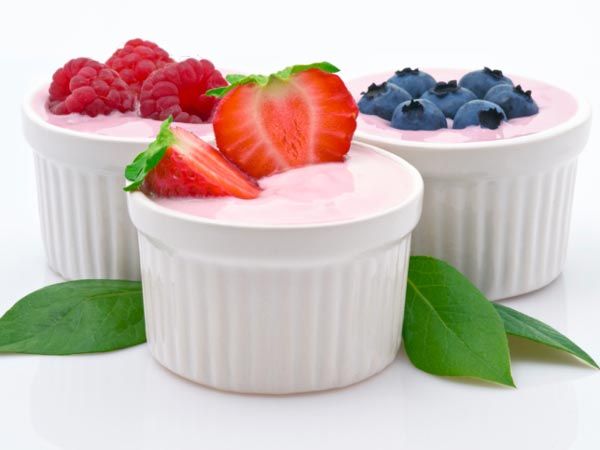
I love yoghurt, and I eat it at least once a day – no matter what the season! I get asked though a lot of questions about yoghurt (how to pick out the healthy pots from the less than healthy ones) and so I thought I’d try to help out!
The main question that I get about yoghurts is around the amount of ‘sugar’ in them… now, although looking at the ‘sugar’ content for baked/processed products is usually useful, when it comes to foods such as milk, yoghurt and fruit the rules change slightly. This is because they contain low GI*, NATURAL sugars which are good for us; milk sugars (lactose) and fruit sugars (fructose). In general though aim to choose a yoghurt that is less than 15g of total sugar per serving or less than 100 calories per serving (these yoghurts tend to be lower in both added sugar and also fat). *Low GI means that the energy is released slowly.
If you’re watching your weight then I recommend a lower calorie yoghurt i.e. less than 100 calories per serving. The ones that normally fit this ‘rule’ are the ones labelled ‘natural’, light’, ‘diet’ or ‘fat-free’. Fruity yoghurts labelled as ‘low-fat’ are often higher in calories because although they take out some fat, they add in more sugar! If on the other hand you’re trying to gain weight then go ahead and buy the full fat/thick and creamy yoghurts (or if you prefer these and you’re not trying to gain weight then just have a smaller portion). Greek yoghurts are the highest in protein – often containing DOUBLE the amount in comparison to normal yoghurts.
Yoghurts make an ideal healthy snack and provide our bodies with:
- High Quality Protein – Greek Yoghurt & Strained Yoghurt contain twice as much protein as other yoghurts. Protein helps us to feel fuller for longer and the specific amino acids (the break down of protein) in yoghurt help our bodies to absorb more calcium and boost our immunity. The protein in yoghurt is also ideal for sports recovery as the protein is more readily digested than the protein in milk (whey protein helps to maintain lean body mass i.e. muscle).
- Calcium: Just one small pot of yoghurt contains 1/3 of your daily calcium needs, essential for bone and teeth health. Lower fat dairy products such as fat-free yoghurt or skimmed milk contain marginally more calcium than the full fat varieties as calcium is a water-soluble mineral.
- Vitamins & Other Minerals: Yoghurt is a fantastic source of vitamin B1 (thiamine) and B2 (riboflavin) which help your body to convert food into energy. Yoghurt also contains phosphorous, which is needed for teeth and bone health, and potassium which plays a role in nerve health and in muscle contraction.
- Live Cultures & Probiotics: The live cultures and probiotics in yoghurt have been shown to boost immunity and improve digestive health (by boosting our good gut bacteria).
Yoghurts make the perfect healthy snack or healthy dessert.. try adding extra fruit such as berries and a sprinkle of home made granola. To flavour plain yoghurts I suggest adding a sugar alternative such as Freedom or Agave Nectar.

Brilliant, Thank you!
I too love yougurts and was easily confused as to which made the healthiest options. Ive recently started having 0% fat greek yougurt with either fresh berries or frozen berries. Ive also been using it for the topping on my skinny triffles 🙂
Oooh that sounds perfect! I love Greek yog in a healthy Eton mess (recipe for that coming very soon!) – thanks for your comment Raina! 🙂 x
Thanks for writing this – it’s so hard to know what kind of yoghurts are the healthiest! And I’ve always been quite anxious about high sugar content of some yoghurts, so it’s great to know that most of it is natural sugar! 🙂 x
No problem 🙂 I aim to make healthy eating easy!! And tasty too 🙂 Thanks for your lovely comment! x
Great piece, Nic! It’s a great source of protein and we’re thrilled more and more people are enjoying strained yoghurt.
Thanks for your lovely comment 🙂 Keep on churning out the lovely flavours 😉
Hello. I have similar favourites to you, I have a rule of no more than 15g sugar per pot. I was wondering whether Weight Watchers yoghurts are good for you?
They contain almost no fat and 8g or less sugars. But they do contain artificial sweeteners…
One thing I particularly hate are yoghurts containing gelatine. I don’t think its fair catching out vegetarians like this who wouldn’t usually check the ingredients.
WW yogs are a ‘diet’ yog, so less than 100Kcal per pot which means lower in fat and sugar. Yes vegetarians have to be careful and read labels – it’s the way of life unfortunately – however I would never buy something without looking at the ingredients first and I’m not veggie!
Thanks for posting this Nic! I am forever struggling to find a healthy yoghurt that actually tastes good! After seeing this and popping into my Sainsbury’s local they had Danio pots on buy one get one free so I got a couple of blueberry ones! Absolutely gorgeous! Also on the online shop they have them 3 for £2 so I’m stocking up.
Although as a treat I love the Yeo Valley coconut yoghurts!
Hi Katrina! Aw thank you for your lovely comment! So glad you found it useful – I love yoghurt and love that there are so many more brands out there to try! I’ve been recommended Greek God lately?! I’ll let you know! Nic xx
Thanks for posting this Nic! I’ve been avoiding yoghurts lately having come across so many articles which recommend not choosing “diet, low-fat” variety yoghurts. It’s hard to know which is the healthiest!
I now can’t wait to try those Muller Light Greek Style! The luscious lemon sounds lovely! 🙂
Aw no worries Talisa! Thank you for your lovely comment 😀 That yoghurt is gorgeous so good choie!! Nic x
Frozen fruit in a food processor and then add Greek yoghurt makes lovely “ice cream” love the Greek
Love that!! Thank you! xx